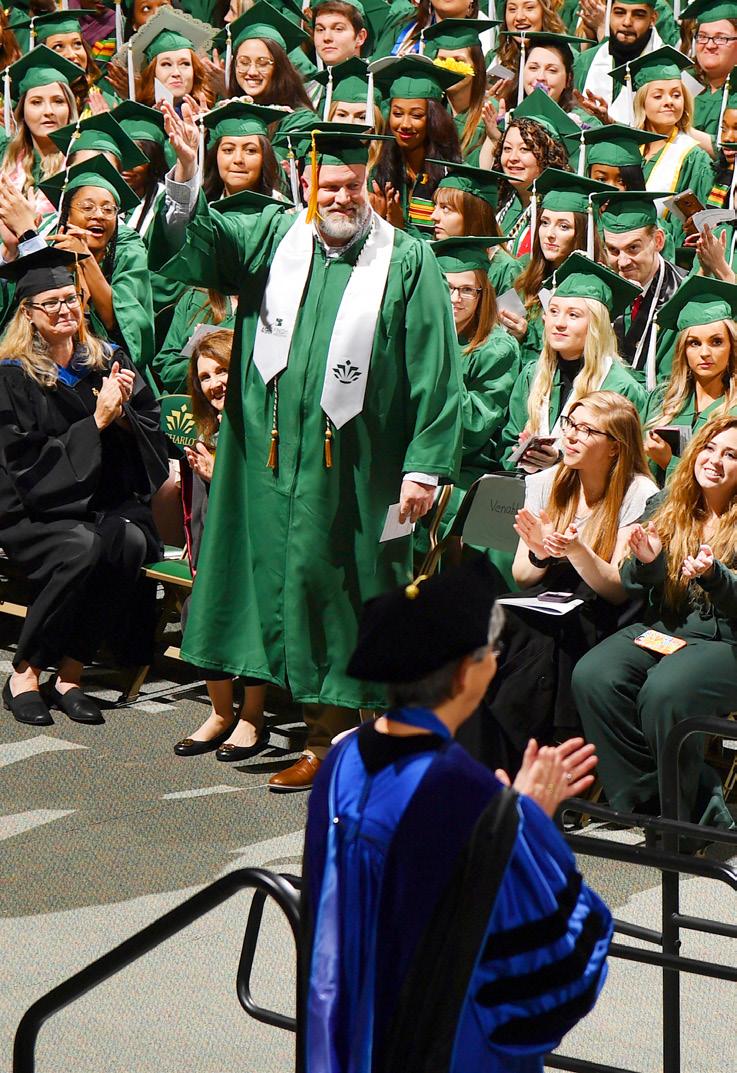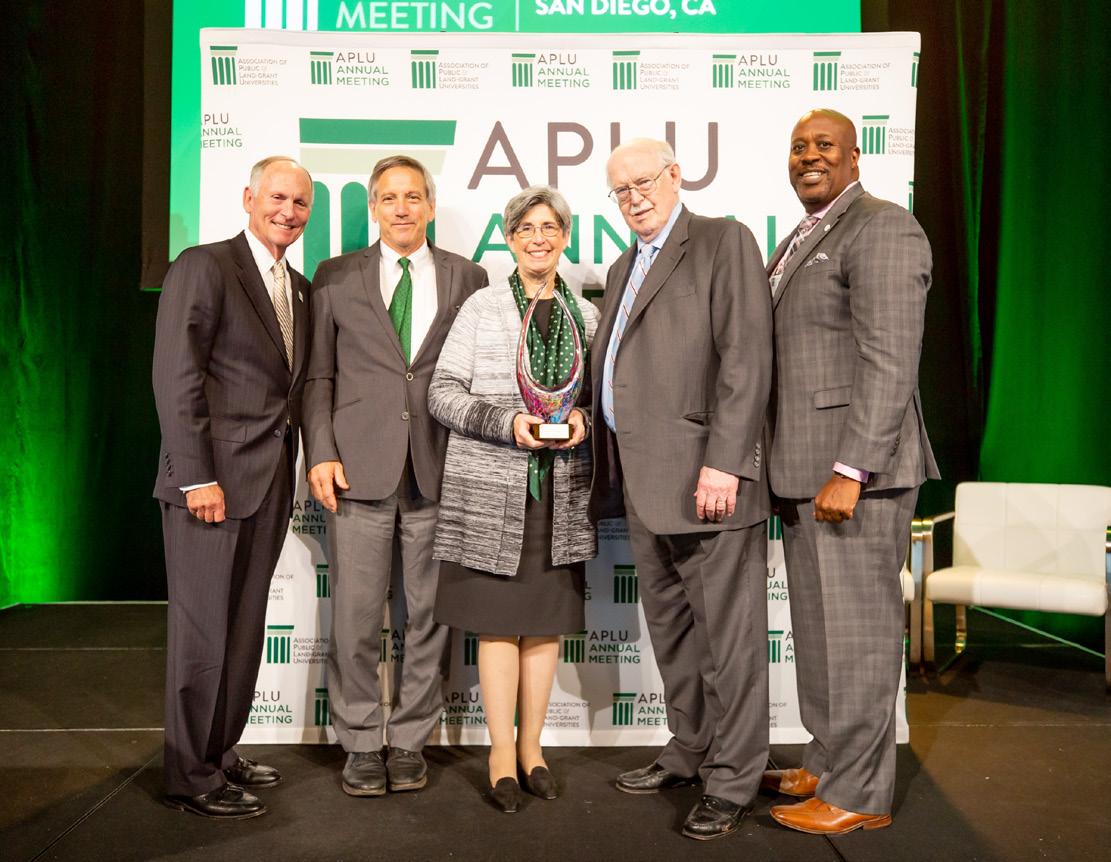
8 minute read
Graduating Niners at a Higher Rate
An agreement between UNC Charlotte and Central Piedmont Community College provides a seamless transition for students in 49er Next, as they enroll at the University after earning an associate degree. 49er Next was signed into action last fall by the two institutions’ leaders, Kandi Deitemyer and Philip L. Dubois, at a news conference at UNC Charlotte Center City. Several other North Carolina community colleges have expressed interest in becoming 49er Next partners. Wade Bruton
UNC Charlotte’s plan to increase graduation rates draws national acclaim
“We recognize the importance of a college degree for jobs of the future and want every student to finish what they start. As a public university committed to access and equity, UNC Charlotte wants to do its part to lessen the student debt burden by ensuring our University’s processes do not impede students from moving toward timely completion of their degrees.” Joan Lorden, provost and vice chancellor for Academic Affairs BY PHILLIP BROWN
With more U.S. jobs shifting to workers with at least a bachelor’s degree—in an environment where only 33 percent of American workers hold a bachelor’s degree or higher—UNC Charlotte is committed to providing access to higher education to all deserving students so they can thrive in the current “college economy.”
Since 2011, the University has focused on creating and implementing a multipronged approach to increase student retention and degree completion among undergraduates. For significantly moving the needle, UNC Charlotte has been recognized by the Association of Public and Land-grant Universities (APLU) with the organization’s 2019 Degree Completion Award.
“UNC Charlotte has implemented a continuous improvement process to build on these (degree completion) gains,” said APLU President Peter McPherson. “Their investment in student-centered transformation has produced sizable gains across all student subgroups in retention and graduation rates. We’re thrilled to spotlight their team’s work so other institutions can learn from it.”
The University recognizes barriers to degree completion that many students face. A group that grapples with a variety of obstacles are those who are first in their families to attend college. At UNC Charlotte, more than 40 percent of the student body are firstgeneration college students; in addition, the number of students eligible to receive Pell grants is the highest in the UNC System.
In 2011, to help students address challenges related to these identifiers, University leaders created the 49er Graduation Initiative, a campus-wide planning effort that engages students as active agents in their success while providing needed support. Results to date are impressive; the 49er Graduation Initiative’s programs are providing an effective model for improving student success.
UNC Charlotte’s six-year graduation rate, a universally recognized higher education metric, is 10 percent higher than it was in 2007. More important, the four-year graduation rate has increased from around 26 percent in 2000 to 43 percent for the institution’s current cohort, nearly 10 percent higher than the national average for public universities. Most significant for students is an overall five percent reduction in student debt upon graduation.
Prospect for Success
The initiative began with Prospect for Success, which guides first-year students through a planning process for timely

graduation. More than 90 percent of new freshman students participate during their first semester, setting realistic goals to graduate in four years. The curriculum is designed to help students effectively interact with college-level inquiry by developing questions, exploring context, conducting research and presenting conclusions. Curricular design also helps them gain greater cultural awareness of themselves and their peers.
Second, proactive advising flags students who fail to meet specific success markers. Using innovative technology, academic
Wade Bruton
Jon Venable, the 1,000th graduate of 49er Finish, was recognized at Fall Commencement. He returned to UNC Charlotte to finish a bachelor’s degree in geology 20 years after leaving the University with only a few credits left to complete.
UNC Charlotte’s efforts to improve student retention and provide pathways to degree completion are regarded as models for others to emulate. Chancellor Philip L. Dubois, Dean of University College John Smail, Provost Joan Lorden and Vice Chancellor for Student Affairs Kevin Bailey accepted the APLU 2019 Degree Completion Award, presented by APLU President Peter McPherson. Wade Bruton

advisors identify students with emerging indications of academic risk and help them realign with their stated graduation goals. Two interventions occur each semester, so advisors can help students in this category explore academic support options or alternative majors.
The third prong—graduation metrics— began with developing standardized datasets that count students enrolled in any given major as juniors, and tracks their graduation across the next eight semesters. Using this data, starting with the 2016-17 academic year, colleges and academic departments are able to develop initiatives that mitigate graduation completion barriers. For example, in colleges with particularly competitive programs, leaders can explore changes to prerequisite sequences that create unnecessary hurdles or change semester schedules to offer critical progression courses year-round.
Lorden stated, “We have accomplished these gains (in graduation rates) during a period of rapid enrollment growth; based upon what we have learned, we believe we can continue to improve graduation outcomes.”
Contributing to UNC Charlotte’s 17 percent increase in four-year graduation rates are one-year student retention rates that continue to grow year-over-year. Data suggests that these improvements will continue for students in the college pipeline.
What’s next? 49erNext
Transfer students represent about 50 percent of UNC Charlotte’s undergraduate population. In fact, their numbers are the highest in the UNC System.
Last fall, the University launched 49er Next, a program that creates a seamless pathway to UNC Charlotte for students enrolled at a participating community college. Charlotte’s Central Piedmont Community College hosts the inaugural program; within the next year, it is projected to expand to several other North Carolina community colleges.
While at Central Piedmont, students enrolled in 49er Next will have access to UNC Charlotte support services such as financial aid and career planning; other student privileges including admission to select 49ers athletics events and other campus events; and a discounted CATS all-access light rail and bus
pass. These are in place so students are familiar with the campus and its operations when they arrive as juniors.
“This partnership with Central Piedmont will ensure UNC Charlotte is meeting students’ academic, financial aid and career planning needs while making the transfer experience as smooth as possible,” said UNC Charlotte Chancellor Philip L. Dubois. “49erNext is designed to produce a greater number of workforce-ready, qualified graduates at a significant cost savings to them. Nearly 60 percent of the inaugural class of 49erNext participants represent underrepresented populations, which is significant given that higher education is an essential path that can lead to greater economic mobility.”
Elli Pineda is a member of the inaugural class of 49erNext students.The first in his family to earn a high school diploma, the Garinger High School graduate struggled to maintain his grades as a freshman. Eventually deciding as he describes to “to take control of my future,” Pineda enrolled in his high school ROTC program. He discovered a passion for computers, improved his grades and for the first time saw college as a real possibility. An Opportunity Scholar at Central Piedmont, Pineda is working toward an associate degree.
“The 49erNext program is a perfect fit for me; it will allow me to explore UNC Charlotte in a different way than most Central Piedmont students--and I can hang out with my friends who are already on campus,” he said.
Central Piedmont and UNC Charlotte have agreed to make collective institutional decisions and implement policies and processes that: • Put students first, enabling them to earn a quality degree in a timely manner • Foster success, ensuring and expecting all students to achieve their full potential • Ensure equity, guaranteeing that all students, regardless of gender, race, income or family educational history, have equal opportunity
Once a Niner, Always a Niner: 49er Finish
UNC Charlotte’s nationally awardwinning 49er Finish program works with undergraduates who stopped short of completing their degrees to encourage them to return and cross the finish line. The program, which is administered by the Office of Adult Students and Evening Services (OASES), launched its concierge approach of service and support in fall 2005. Its fundamental purpose is to reach out to senior-level students who left the University prior to graduating and help make degree completion a reality for them.
Recently, the program celebrated a major milestone by recording its 1,000th graduate. Jon Venable crossed the stage at Fall Commencement, where he accepted a bachelor’s degree in geology, completing what he started more than 20 years ago.
Venable left UNC Charlotte in August 1998 just four credit hours shy of finishing. He quit, married his college sweetheart and began full-time work with Carpenter Company. About two years ago, after a divorce and the death of his mother, Venable was ready to make a change. Responding to communication he’d received from UNC Charlotte about 49er Finish--and at the urging of his fiancée, Michelle—he decided to enroll.
“After calling the University to find out about the program, Michelle said, ‘You’re going to do this and I am going to make sure.’”
Debbie Smith, associate director of operations/director of advising for OASES, said, “Jon needed information about the number of remaining courses, costs and availability before completing a readmit application. Finding options for students who have been out for 20 years requires additional research and advising assistance from academic departments. The Geography and Earth Sciences Department responded amazingly fast, motivating Jon to move forward.”
Venable knows a college degree is necessary for careers of the future. It’s a message he is sharing with his children.
“I tell them that the time they invest in their studies now will pay dividends later,” he said. “My mom always wanted me to finish; I wish she could have been here to see it.”
OASES staff and advisors continue to seek out students who left short of completing degrees.
“We are serious about wanting our students to finish,” said Smith. “You are still a 49er and an important part of campus.”
Phillip Brown is assistant director of internal communications in the UNC Charlotte Office of University Communications and associate editor of this publication.
OUTCOMES.”
—JOAN LORDEN, PROVOST AND VICE CHANCELLOR FOR ACADEMIC AFFAIRS






